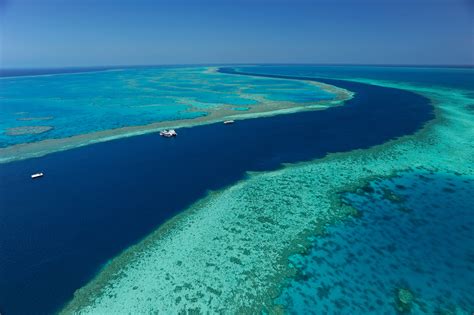The Great Barrier Reef in Australia is the world’s largest coral reef system, stretching over 1,400 miles along the Queensland coast. Comprising more than 2,900 individual reefs and 900 islands, it covers an area of approximately 133,000 square miles. Renowned for its stunning biodiversity, the reef supports a vast array of marine life, including over 1,500 species of fish, 400 species of coral, and numerous species of mollusks and crustaceans. It is not only a UNESCO World Heritage site but also a critical component of the global marine ecosystem. The Great Barrier Reef faces significant environmental threats, such as coral bleaching, climate change, and pollution, which have raised concerns about its future. Despite these challenges, the reef remains a vital and iconic symbol of natural beauty and marine conservation, attracting millions of visitors each year. There are many additional facts about the Great Barrier Reef that highlight its ecological importance, conservation efforts, and the challenges it faces.

Ecological Significance and Biodiversity
The Great Barrier Reef’s ecological significance is immense, due to its unparalleled biodiversity and complex marine ecosystems. As one of the most diverse marine environments on the planet, the reef is home to thousands of species that interact in intricate ways. Coral reefs are often described as the "rainforests of the sea" because of their rich biodiversity and the vital roles they play in marine ecosystems. The reef provides critical habitat for a variety of species, including endangered sea turtles, large predators like sharks and rays, and numerous species of marine mammals. Its coral formations support not only marine life but also protect coastlines from erosion and storm surges, making them essential for both environmental health and human communities. Additionally, the Great Barrier Reef acts as an important breeding ground for many species of fish and invertebrates, contributing to the health and stability of the wider marine environment. Its status as a UNESCO World Heritage site underscores its global ecological importance and the need for ongoing conservation efforts.
Threats and Environmental Challenges
The Great Barrier Reef faces several significant threats that pose serious challenges to its health and sustainability. One of the most pressing issues is coral bleaching, which occurs when corals expel the symbiotic algae living within their tissues due to stress from rising sea temperatures. Bleached corals are more susceptible to disease and mortality, leading to a decline in coral cover and a loss of habitat for marine life. Climate change is a major driver of increased sea temperatures and ocean acidification, which further exacerbate the impacts of bleaching. Pollution from agricultural runoff, which introduces excess nutrients and pesticides into the reef system, contributes to algal blooms that can smother corals and disrupt the delicate balance of the ecosystem. Additionally, overfishing and unsustainable tourism practices pose further risks to the reef’s health. Conservation efforts are critical to addressing these threats, and they involve both local and global initiatives to mitigate the impacts of human activity and climate change on this vital natural resource.
Conservation Efforts and Management
Conserving the Great Barrier Reef requires a multifaceted approach, involving a range of strategies to protect and manage this delicate ecosystem. The Australian government, in collaboration with various environmental organizations, has implemented several programs aimed at safeguarding the reef’s health. One key initiative is the Great Barrier Reef Marine Park Authority, which oversees the management and protection of the reef through zoning plans, regulations, and monitoring programs. These measures include restrictions on fishing, tourism, and other activities that could harm the reef. Efforts are also focused on scientific research to better understand the reef’s ecosystems and to develop strategies for mitigating the effects of climate change and pollution. Restoration projects, such as coral farming and reef rehabilitation, aim to enhance the resilience of the reef and promote recovery from damage. Additionally, public awareness campaigns and educational programs help to engage the community and encourage responsible behavior to support the reef’s conservation. These comprehensive efforts are crucial for ensuring the long-term survival of the Great Barrier Reef.
Tourism and Economic Impact
Tourism plays a significant role in the economy of the region surrounding the Great Barrier Reef, generating substantial revenue and providing employment opportunities. The reef attracts millions of visitors each year, who come to experience its natural beauty and participate in activities such as snorkeling, scuba diving, and boat tours. The economic impact of tourism extends to local businesses, including hotels, restaurants, and tour operators, which benefit from the influx of tourists. However, managing the balance between tourism and conservation is a complex challenge. Responsible tourism practices are essential to minimizing the environmental impact on the reef, and efforts are being made to promote sustainable tourism that supports conservation goals while providing an enjoyable experience for visitors. Initiatives include limiting the number of visitors to sensitive areas, implementing environmental management plans for tour operators, and promoting eco-friendly practices. By fostering a sustainable approach to tourism, it is possible to support the local economy while ensuring the protection and preservation of the Great Barrier Reef.
Research and Scientific Discoveries
Scientific research and exploration play a crucial role in understanding and preserving the Great Barrier Reef. Researchers from around the world conduct studies to investigate various aspects of the reef’s ecosystems, including coral biology, marine species interactions, and the impacts of environmental stressors. One notable area of research is coral reef resilience, which examines how corals and associated marine life respond to changing conditions such as temperature fluctuations and ocean acidification. Discoveries from this research help inform conservation strategies and contribute to the development of new technologies and methods for reef restoration. Additionally, scientific exploration of the reef has led to the identification of new species and the documentation of previously unknown behaviors and interactions among marine organisms. The knowledge gained from ongoing research is essential for improving our understanding of the reef and enhancing efforts to protect and manage this vital natural resource.